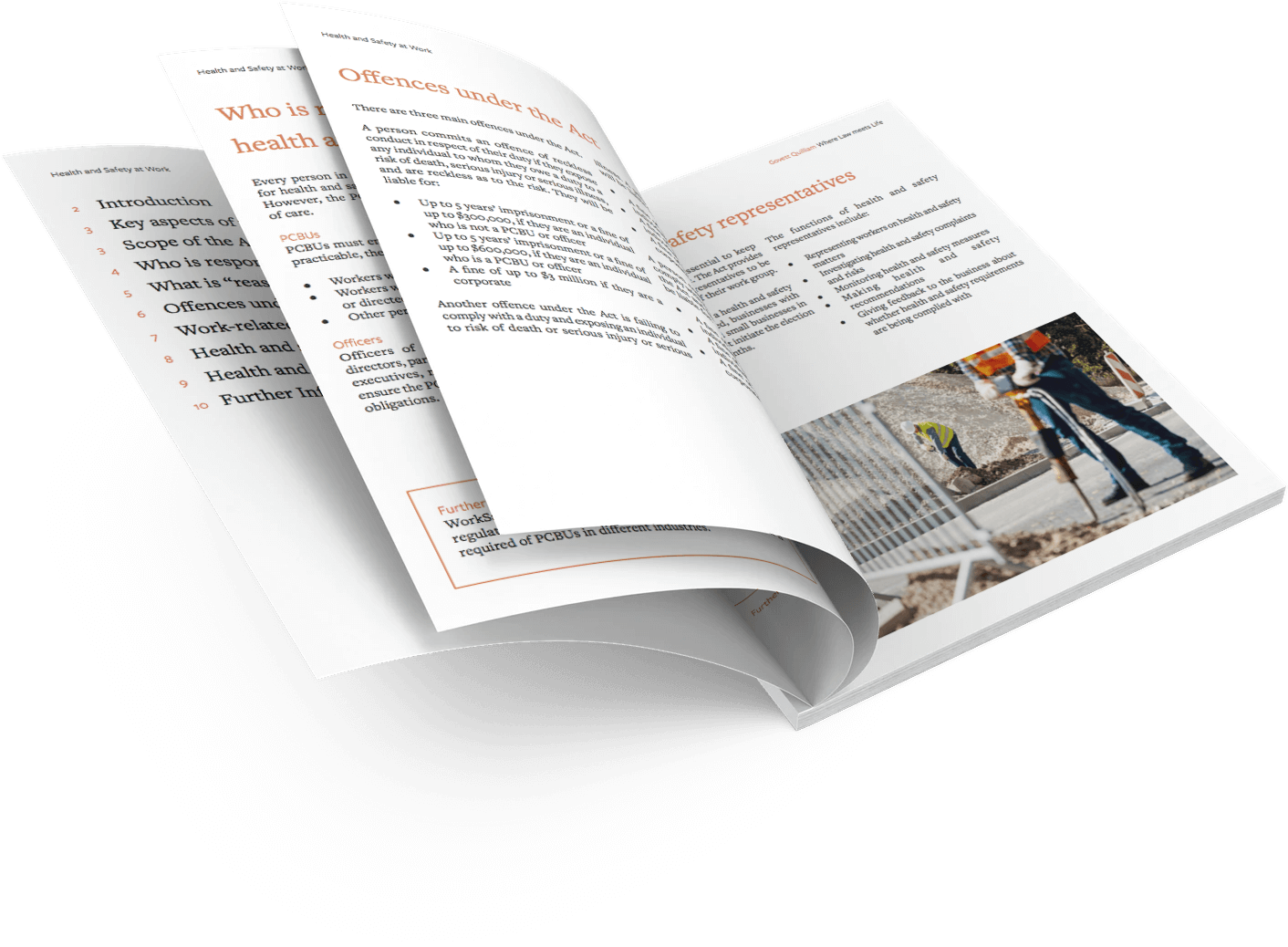
Over 24,000 incorporated societies in New Zealand will be affected by the recent changes brought in by the Incorporated Societies Act 2022.
It is important for those involved with incorporated societies to be aware of the impacts of this new Act, and the changes they will need to prepare for.
For many societies, their constitution and rules will need to be updated to meet the new legislative requirements. With the number of societies affected, there is a transition period of several years to allow societies the time they need to prepare and make the necessary changes.
Alongside these changes, societies will be required to reregister before 1 December, 2025. Before applying to reregister, societies will need to amend their rules and constitution. Until a society reregisters, they will continue to operate under the Incorporated Societies Act 1908.
Why have these changes been made?
The Incorporated Societies Act 1908 has been in operation for over 110 years. In 2010, a Law Commission report described the Act as “uncomfortably old and has been little amended", and made a number of recommendations.
The purpose of the legislative overhaul is to -
- improve the self-governance of societies;
- strengthen the responsibilities of financial compliance;
- introduce statutory duties for the officers of societies; and
- to provide members with a constructive dispute resolution process.
Below is an overview of the expanded requirements and new additions, as well as the new provisions to be included in a Society’s Rules and Constitution.
Expanded requirements and new additions
1. Society constitutions
The new Act has a non-exhaustive list of statutory requirements which must be contained in every constitution. These include how the following functions will need to be altered or updated - committee functions, running general meetings, management of financial records, process to become a member, keeping the members register, entering into legal obligations, and resolving disputes.
2. Reregistration and transition
All registered incorporated societies will be required to reregister before, 1 December 2025. The transition period permits each society time to amend or approve its rules and constitution to comply with the new Act.
If a society fails to reregister and meet the legislative requirements by the transition date, they may cease to exist.
3. Qualification to become a societyThere is a reduction from the minimum requirement of 15 to 10 people to form an incorporated society. This minimum must be maintained for the continuance of the society, or the registrar may order them to increase their membership to comply.
4. Statutory officer and officer dutiesThe 1908 Act does not provide governance structures in terms of a requirement to have a committee, or to have appointed or elected officers. Under the new Act the committee must comprise of three or more statutory officers who are qualified to be elected or appointed.
An officer of the society must be a natural person, they may be elected or appointed. They must consent in writing to be an officer and certify they are not disqualified from being elected.
The duties of officers are to be codified under the new Act. The duties are comparable to those of a company director.
The officers duties include-
- to act in good faith and in the best interests of the society
- to exercise their powers for a proper purpose
- to comply with the legislation and the society’s constitution
- to exercise reasonable care and diligence
- not to create substantial risk of serious loss to the society’s creditors
- not to agree to the society incurring obligations that it cannot perform.
The new Act does not permit the distribution of assets to members if the society is dissolved.
When a society is dissolved, after paying its debts, the surplus assets must be distributed to another incorporated society, charitable trust or not-for-profit organization.
6. Financial reporting
The current minimum reporting standard required is an annual financial statement, assets and liabilities, mortgages charges or encumbrances, to be delivered to the Registrar. The new reporting standard is more robust and must comply with financial reporting standards dependent on the society’s size. A more extensive financial standard will be required than the proposed filing of at least simple annual financial reports.
The reporting standard required is dependent on whether the society is small or large and falls into the GAAP (generally accepted accounting principles) or non-GAAP standard. Societies who have annual total operating payments exceeding $50,000.00 will be required to have their accounts audited annually.
Societies that are registered charitable entities are already required to provide annual returns and financial statements in compliance with the Charities Act 2005.
The new provisions to be included in a society’s rules and constitution
1. Dispute resolution provision
A constitution is to include provisions for resolving disputes between or raised by members, and to be consistent with the rules of natural justice. The procedure for delivery of a decision may include the right to appeal or review.
2. Member consents
To become a member of a society, consent must be sought from that person. Consent of a body corporate to become a member may be given if the person acting has express or implied authority.
3. Statutory officer and officer duties
The statutory officers and their duties, as described above, will need to be included in a society's rules and constitution.
4. AmalgamationA pared down amalgamation process now permits two or more societies to amalgamate into a new society. This change will allow small or financially compromised societies to fluidly join members, assets and assume existing contractual obligations.
For an amalgamation to occur, it must be approved by a simple or higher majority vote in accordance with the society's constitution.
5. Civil enforcement
The 1908 Act is silent on how a current member can enforce a society’s constitution. The pathways available to resolve a civil law dispute are by contract law, judicial review, or the Declaration of Judgments Act 1908.
The new Act provides framework for enforcement of a civil case. Any member, society, former member, officer or registrar can apply to the court for an order of enforcement
An application can be made to the court for -
- enforcement of rights or obligations of a society
- performance or observation
- to restrain from acting contrary to
- a breach of the bylaws or constitution.
6. Offences
The introduction of criminal offences attracting penalties that vary from 1 to 5 years imprisonment, or fines from $10,000 to $200,000, raises the standard of conduct and reporting by an officer, member, or employee of a society.
The offences include -
- false statement
- fraudulent use or destruction of property
- falsification of register, records, or documents
- operating fraudulently or dishonestly incurring debt
- improper use of “Incorporated”, “Inc”, or “Manatōpū”, or any contradiction when not permitted to use would be subject to banning contravention order.
In addition to these offences there are a number of infringement offences for minor infractions.
The Incorporated Societies Act 2022 requires all incorporated societies in New Zealand to adjust their processes to comply with the new provisions and expanded requirements. While there is a long transition period to allow societies to comply, it is important that members begin to plan to make these changes so they are able to reregister before the cut off date, as any societies who do not reregister before 1 December, 2025, may be struck from the register.
This article is a summary only. It is not specific legal advice and must not be relied on as legal or business advice. It is recommended that clients should consult a representative of the firm before acting upon this information.
If you have any questions about what these changes mean for your Incorporated Society, please get in touch with a member of our Commercial Law team.
Author: Kozett Guise-Smith Kozett is a Lawyer in our Property and Corporate and Commercial Teams.
Kozett is a Lawyer in our Property and Corporate and Commercial Teams.
Hailing from Southland, Kozett grew up in a multi-generational farming family. Growing up on the family farm meant getting involved in all manners of tasks including lambing beats, dipping, drenching, shearing and feeding out.
Kozett's various careers have led to her living in Southland, South Australia, Canterbury, Auckland and the Waikato. Whilst living in Cambridge, Kozett served on the committee of Waikato Hunt Inc for ten years and as a trustee of Cambridge Early Learning Centre “The Castle” for two years before embarking on an educational journey. That journey commenced with a Legal Executive Diploma, followed by a Bachelor of Laws with a minor in Human Resources. Kozett has a particular interest in rural law, and has studied environmental law, water law and climate change law.






.png)

